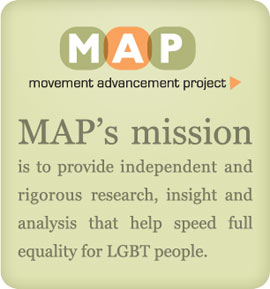A new issue brief released today highlights how discriminatory laws and unequal access to family and medical leave laws force lesbian, gay, bisexual, and transgender (LGBT) workers to choose between managing medical or family crises and jeopardizing their livelihoods.
Workers may need extended leave due to the birth or adoption of a child, a serious illness or injury, or to provide care for a family member with a serious medical condition. Yet, in the 34 states where same-sex couples cannot marry, LGBT families are often denied equal access to job-protected leave and face added obstacles to managing such situations. Transgender workers may confront challenges getting job-protected leave for their own transition-related care. An Impossible Choice: LGBT Workers and Family Leave Laws examines these barriers and offers includes common-sense policy recommendations.
The brief was authored by the Movement Advancement Project, the Center for American Progress and the Human Rights Campaign, in partnership with A Better Balance, Family Values @ Work and the National Partnership for Women & Families.
“When taking leave due to medical or family needs, far too many LGBT workers risk losing their jobs and jeopardizing their financial security at a critical juncture in their lives,” said Jared Make, Senior Staff Attorney at A Better Balance. “But the alternative—not taking time off during a personal illness, a child’s birth or adoption, or a family member’s serious illness—could mean getting sicker or not being there for loved ones who need them. No one should ever be put in that position.”
“LGBT workers should have the same access to job-protected leave as their coworkers,” said Ineke Mushovic, Executive Director of the Movement Advancement Project. “Federal and state leave laws should be expanded to give all workers, including LGBT workers, the opportunity to take paid leave to care for themselves or their loved ones. Asking LGBT workers to make an impossible choice between losing a job and taking care of themselves or their families is unfair and harmful to families.”
An Impossible Choice: LGBT Workers and Family Leave Laws is based on content from A Broken Bargain: Discrimination, Fewer Benefits and More Taxes for LGBT Workers, the most complete portrait to date of the LGBT workforce in the U.S. For more information, visit www.lgbtmap.org/lgbt-workers.
# # #
Report Co-Authors
The Center for American Progress is a nonpartisan research and educational institute dedicated to promoting a strong, just and free America that ensures opportunity for all. We believe that Americans are bound together by a common commitment to these values and we aspire to ensure that our national policies reflect these values. CAP’s FIRE Initiative works to eliminate the social, economic, and health disparities faced by LGBT people of color.
The Human Rights Campaign is America’s largest civil rights organization working to achieve lesbian, gay, bisexual and transgender equality. By inspiring and engaging all Americans, HRC strives to end discrimination against LGBT citizens and realize a nation that achieves fundamental fairness and equality for all.
MAP's mission is to provide independent and rigorous research, insight and communications that help speed equality and opportunity for all. MAP works to ensure that all people have a fair chance to pursue health and happiness, earn a living, take care of the ones they love, be safe in their communities, and participate in civic life.
Report Partners
A Better Balance is a national legal advocacy organization dedicated to promoting fairness in the workplace and eliminating barriers to economic security for workers who are caring for their families.
Family Values at Work is a national network of 21 state and local coalitions helping spur the growing movement for family-friendly workplace policies such as paid sick days and family leave insurance.
The National Partnership for Women & Families is a nonprofit, nonpartisan organization that promotes fairness in the workplace, reproductive health and rights, access to quality, affordable health care, and policies that help women and men meet the dual demands of work and family.


